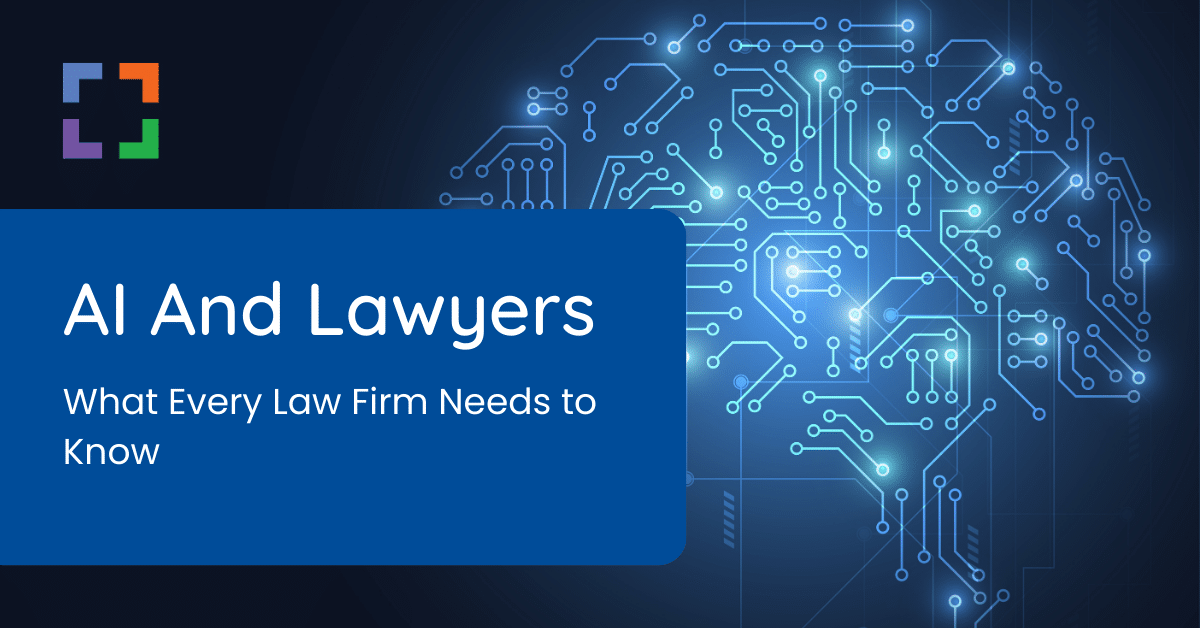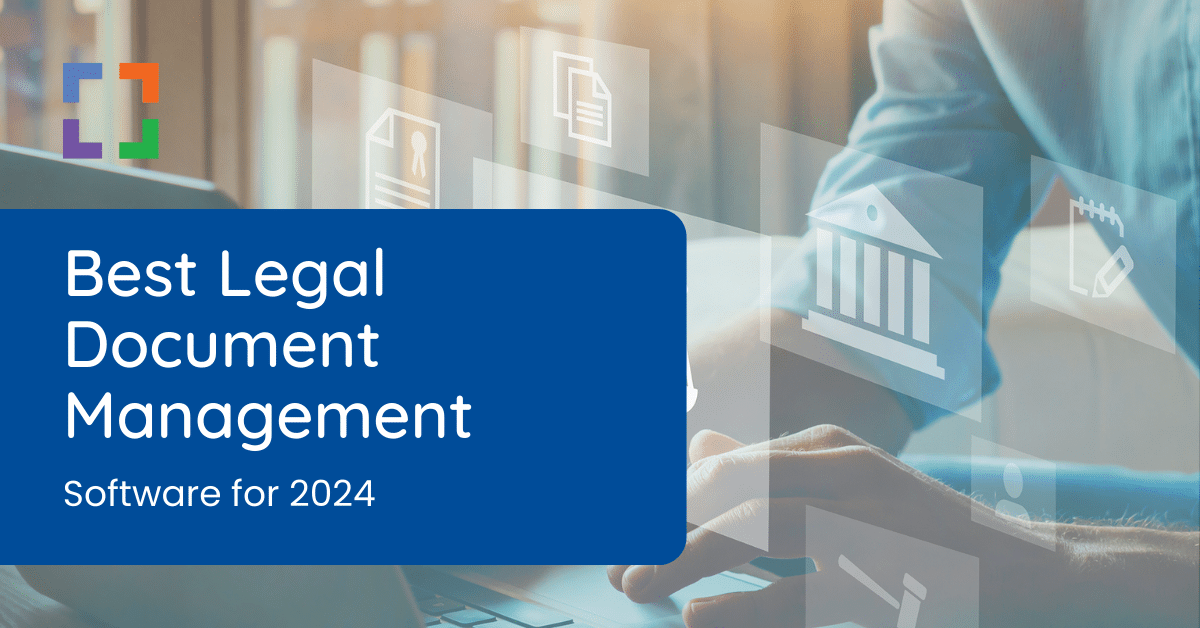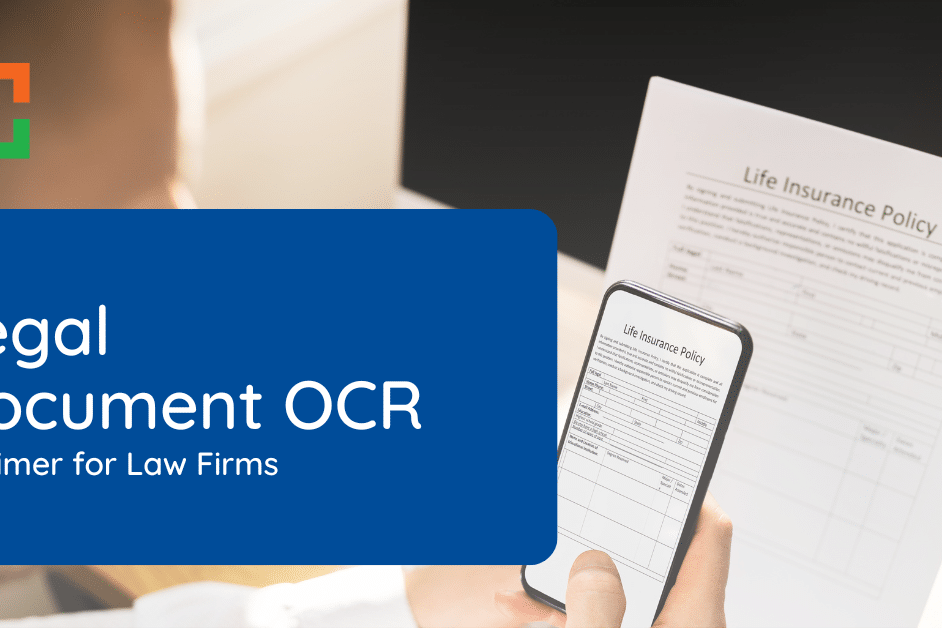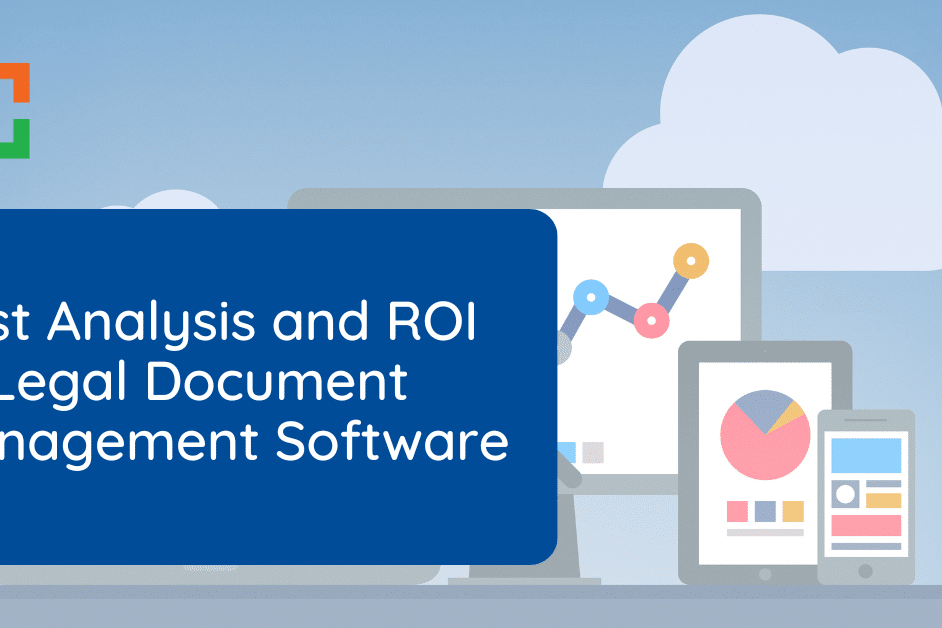AI for Legal Documents: Benefits, Use Cases, and AI Tools
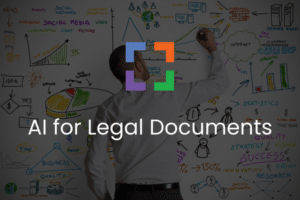
The intersection of AI and the legal industry is transforming how legal professionals run their law firms, including all things document management.
AI offers unprecedented tools for generating, reviewing, and analyzing legal documents, thereby reshaping the landscape of legal practices. This shift not only promises to increase efficiency but also to enhance the accuracy of legal work.
In this article, you will learn:
- The transformative power of AI in legal document management.
- Insights into AI's role in document generation, review, and analysis.
- Key AI tools that are changing the game for legal professionals.
With AI’s potential to revolutionize the legal field, understanding its application in document handling is more crucial than ever.
Let’s dive into how AI sets a new legal document management standard.
Learn how you can make the most of artificial intelligence to improve your law firms efficiency.
The Rise of AI in Legal Document Management
The evolution of AI technology has been nothing short of revolutionary and shows no signs of slowing down.
Large Language Models (LLMs) like GPT-3 and GPT-4 (iterations of ChatGPT) demonstrate the most significant jumps in artificial intelligence in years.
They accept text and image input and emit text-based replies based on their extensive knowledge gathered from public internet data and “data licenses from third-party providers.”
And with OpenAI bringing Chat GPT-4 to the masses, no industry has gone unaffected.
Many law firms have begun using ChatGPT to assist with tasks like legal research, document drafting, or contract review.
It’s often more effective than any intern or junior lawyer could be.
In March 2023, GPT-4, an advanced iteration of the Generative Pre-trained Transformer developed by OpenAI, passed the state bar exam with flying colors.
It also passed the US Medical Licensing Exam without clinician input.
These achievements show the potential of AI technologies like ChatGPT in professional fields requiring high levels of expertise and critical thinking.
Initially, AI applications in law focused on automating routine tasks and managing case files.
Today, they encompass a broader range of functions, including complex document analysis and predictive modeling, thanks to more sophisticated algorithms and computational power.
Related – AI and Lawyers: Learn what every lawyer should know about the rise of AI in the legal industry.
Current AI Technologies Used in Legal Document Management
AI technologies currently used in legal document management vary from simple automation tools to advanced systems capable of generating, reviewing, and analyzing complex legal documents.
ChatGPT and similar large-language models are at the forefront of this. They offer solutions that drastically reduce the time and effort required to handle legal documents.
Examples of AI Applications in Legal Settings
- Document Automation and Generation: AI systems can now draft legal documents with minimal human input. The generated documents can meet legal standards and are tailored to specific cases without the risk of human error.
- Contract Review and Analysis: AI tools are capable of reviewing contracts, identifying key clauses, highlighting potential issues, and streamlining the review process for legal professionals.
- Predictive Analysis: Leveraging historical data, AI can predict the outcomes of legal cases with remarkable accuracy, aiding lawyers in case preparation and strategy development.
The accomplishments of GPT-4 highlight not only the current capabilities of AI in the legal field but also its potential to redefine what’s possible. With AI achieving such milestones, the legal industry is poised for a future where technology and human expertise merge to enhance legal practices like never before.
It’s easy to see that AI is already changing the legal industry for the better. With AI helping to complete busy work, lawyers free up more hours for billable tasks. And it’s only going to get better.
Detailed Use Cases of AI in Legal Documents
Implementing AI in legal document management can help busy lawyers complete “low-value work” and spend more time on billable tasks.
Focusing on the use cases of AI legal document generation, review, and analysis, we see how these technologies streamline processes and introduce higher levels of precision and efficiency.
1
AI Legal Document Generation
Rather than spending hours drafting contracts, legal briefs, and other documents, lawyers can use AI tools to expedite the process and do so accurately.
Not only that but AI does so in the context and language you’d expect, thanks to the natural language processing and machine learning algorithms it’s trained on.
AI is also being integrated into many tools lawyers are already using. These AI-enabled tools use natural language processing and machine learning algorithms to generate entire legal documents in seconds.
You can then ask AI to draft or redraft entire documents.
Here’s an example of a prompt a lawyer would use to draft an NDA for his client.
Generate a simple Non-Disclosure Agreement (NDA) for a consulting engagement between my client, Acme Corp (the ‘Disclosing Party’), and a freelance graphic designer, Jane Doe (the ‘Receiving Party’). The agreement should be governed by the laws of California and must include the following key clauses:
- Definition of Confidential Information: Include standard definitions but ensure that Acme Corp’s business strategies, client lists, and proprietary technologies are explicitly covered.
- Obligations and Duties of the Receiving Party: Specify that the Receiving Party must not use the confidential information for any purpose outside of the consulting engagement and must take reasonable precautions to prevent its disclosure.
- Exclusions from Confidential Information: State that information publicly available or independently developed by the Receiving Party without using the Disclosing Party’s confidential information is not considered confidential.
- Term: The obligation of confidentiality should remain in effect for 2 years from the date of the agreement.
- Return of Confidential Information: Upon termination of the agreement or at the Disclosing Party’s request, all confidential information, including copies, must be returned or destroyed.
Please format the document for a professional setting and include a place for both parties to sign and date the agreement.
This process minimizes human error and keeps your consistency across legal documents. For instance, a real estate law firm might use AI to automatically generate lease agreements tailored to the specific terms agreed upon by the parties.
This capability significantly reduces the time lawyers spend on routine drafting tasks, freeing them up for more complex legal work.
2
AI Legal Document Review
AI excels in reviewing documents. It can quickly scan a legal document and identify key terms, clauses, and potential issues that might require closer inspection.
For example, you could ask AI to scan a document and look for inconsistencies and errors.
And it can finish scanning through thousands of documents much faster than any human reviewer could, making case preparation much easier.
A tool like ChatGPT can suffice for many of these tasks.
However, you would need to take extra steps to:
- Redact identifiable and sensitive information in legal documents before using ChatGPT to safeguard privacy and confidentiality. This step is crucial for lawyers as some AI platforms utilize submitted data for training large language models (LLMs).
- Provide specific guidelines and parameters to ChatGPT each time it's used to evaluate a legal document. It’s essential for accuracy, but this process can become burdensome when using AI frequently.
- Incorporate revisions into legal documents after AI-assisted reviews, often requiring toggling between ChatGPT’s suggestions and the original Word documents to update the text accordingly.
ChatGPT could be good enough for solo attorneys or small law firms. However, I recommend AI contract review software made specifically for lawyers in most cases to bypass the headaches of using ChatGPT for sensitive legal documents.
3
AI Legal Document Analysis
AI tools can also dissect and analyze legal documents.
For example, an AI system could look at a contract and foretell potential disputes, giving lawyers a head start to sidestep potential problems.
AI can even generate contract summaries and contract abstracts for legal documents — an easy and effective way to generate summaries in plain language for you to share with stakeholders.
Benefits and Challenges of AI in Legal Practices
There are many advantages to incorporating AI into your legal practice, many of which I’ve already discussed.
I’m going to go through those benefits again but also highlight some challenges the legal industry needs to navigate because of AI.
The Upsides of AI in the Legal Field
AI has many benefits, including:
- Efficiency and Time Savings: One of the most tangible benefits is the reduced time required for document-related tasks. AI's ability to quickly process, analyze, and generate legal documents frees attorneys to concentrate on their work's more complex, high-value (and billable) aspects.
- Accuracy and Consistency: AI tools reduce the risk of human error, ensuring that documents are consistent and accurate. This reliability is particularly crucial in legal settings where the stakes are high, and mistakes can have serious consequences.
- Cost Reduction: Law firms can lower operational costs by automating routine tasks. This efficiency can also be passed on to clients through lower legal fees, making legal services more accessible.
- Data-Driven Insights: AI can analyze large volumes of data to provide previously unattainable insights. This capability allows legal professionals to make informed decisions, predict case outcomes, and offer strategic advice based on comprehensive data analysis.
- Gather Information from One or More Documents Instantly: AI allows you to search all your documents for a specific matter or case. For example, you could search your documents for all matters relating to child custody.
Related – Best Legal Document Management Software: Learn about the industry’s top legal document management software.
Challenges Facing Legal AI Adoption
The unfortunate reality is that with any advancement in technology comes security concerns and potential bad actors who exploit those potential breaches.
Here are the main challenges I see law firms facing:
- Ethical and Privacy Concerns: The use of AI in law raises questions about confidentiality, data security, and the ethical use of technology. Make sure AI systems you use are secure and respect privacy laws.
- Dependence on Technology: There's a risk that reliance on AI could diminish lawyers' skills over time, especially in tasks related to document review and analysis. Balancing technology use with ongoing professional development is essential.
- Regulatory Compliance: The legal field is heavily regulated, and integrating AI solutions must be done in compliance with all relevant laws and regulations. This requires a thorough understanding of both legal and technological frameworks. This challenge is mitigated with the proper use of document management software.
- Implementation Challenges: Adopting AI technology can be costly and complex, particularly for smaller practices. The initial investment in time and resources can be a barrier to entry for some.
Despite these challenges, the benefits outweigh the challenges, and it’s worth getting on board early.
As technology continues to evolve, so too will the need to adopt AI — as will the strategies for overcoming these obstacles, paving the way for more innovative and efficient legal practices.
The key will be to find the right balance between leveraging AI’s capabilities and maintaining the high standards of the legal profession.

“LexWorkplace is very fast, and documents are easily accessible. Working remotely is seamless.”
Nathan Cobb
Law Offices of Nathan Cobb
See Why Lawyers Love LexWorkplace
Get Organized. Work Anywhere. LexWorkplace is modern Document & Email Management, born in the cloud and built for law firms.
Evaluating AI Tools for Legal Document Management
AI can significantly help your law firm become more efficient and scale, but only if you choose the right AI tools.
Any tools your law firm uses should be heavily vetted to make sure they are the right fit, and that is even more important with AI.
Here are some guidelines to help you evaluate an AI tool.
Is the AI tool compatible with it, and does it integrate seamlessly into your existing software stack?
The chosen AI tool should seamlessly integrate with your existing legal practice management software and workflows.
At the end of the day, any tool you choose should make your life easier, not harder.
Consider how well the AI tool complements current processes and whether all relevant team members can easily adopt it.
Don’t choose software that you need to work to integrate into your current workflow — it should naturally fit in.
Does it have the features and capabilities you want?
Legal document management AI tools offer a range of features, from document generation and review to complex analysis and predictive insights.
Legal professionals should clearly identify their needs and evaluate whether a tool's specific features address those needs effectively.
Don’t settle for any old document management tool — it should have customizable and specialized functions tailored specifically for the legal industry.
Is the user experience positive and easy to use?
Like any tool, it’s only effective if your team is willing and able to use it.
For that reason, ease of use is one of the most important factors for any AI tool.
Look for a tool with an intuitive interface and accessible support resources. Tutorials (both written and video) and actual customer service can help lessen the learning curve.
Additionally, ongoing support and training resources are valuable for adapting to updates or resolving potential issues.
Do they have high standards for security and privacy?
You know just how sensitive legal documents can be, so it’s important that any AI tool you use adheres to the highest standards of data security and privacy.
This includes compliance with regulations such as the General Data Protection Regulation (GDPR) and industry-specific guidelines.
I always recommend legal industry-specific AI tools as they’re built with security in mind. But if you do opt for a tool like ChatGPT, be cautious and take extra steps to protect your client data.
Is it a scalable and future-proof tool?
The legal profession is dynamic and always evolving. An AI tool that is scalable and regularly updated with new features can grow with your practice, ensuring longevity and continued relevance. Assess the tool's roadmap for future updates and its history of adapting to legal and technological advancements.
Is it within budget?
While the initial investment in AI technology may be significant, the tool's cost should be evaluated in light of the potential long-term benefits and efficiencies it offers.
Consider the tool's pricing model, scalability, and potential to reduce overhead or administrative costs.
Overview of Leading AI Tools for Legal Professionals
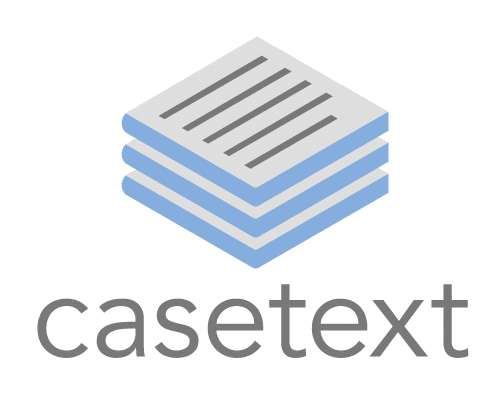
Casetext
Casetext is a comprehensive legal research platform designed to enhance the efficiency and accuracy of legal research for attorneys.
Highlight: Streamlines document review, deposition preparation, contract analysis, and timeline creation in minutes—with results you can trust.
- Contextual Legal Search: Uses AI to provide search results tailored to the specific context of your case or argument.
- CARA A.I. Technology: Automatically suggests relevant legal precedents and citations by analyzing uploaded legal documents.
- Workflow Integration: Seamlessly integrates with legal practice workflows, enhancing productivity without disrupting existing processes.
- Advanced Analytics: Delivers deep insights and analytics, helping legal professionals make informed decisions quickly.

Lex Machina
Lex Machina provides legal analytics to companies and law firms, offering strategic insights across millions of cases and legal proceedings.
Highlight: Specializes in legal analytics, offering data-driven insights that empower attorneys to craft winning strategies based on historical case outcomes and trends.
- Data-Driven Insights: Access to analytics on judges, lawyers, parties, and the outcomes of their cases to inform strategy.
- Legal Analytics: Harness the power of big data to predict trends, case timings, and likely outcomes.
- Practice-Specific Modules: Specialized modules for various practice areas, including intellectual property, antitrust, and employment.
- Competitive Intelligence: Enables firms to benchmark against competitors, understanding their litigation histories and strategies.

Diligen
Diligen is an AI-powered legal technology platform that simplifies the process of document review and due diligence for law firms and legal teams.
Highlight: Offers rapid document review with AI-driven insights, making it ideal for contract analysis and due diligence, ensuring thoroughness and accuracy.
- Contract Analysis: Utilizes AI to quickly identify and categorize key contract provisions, enhancing review efficiency.
- Due Diligence Acceleration: Streamlines the due diligence process, allowing legal teams to complete reviews faster without sacrificing detail or accuracy.
- Custom Tagging: Features customizable tags that adapt to the specific needs of a law firm’s review process, improving organization and searchability.
- Collaborative Review Tools: Facilitates team collaboration on document review projects, ensuring consistency and enabling efficient project management.

Gideon
Gideon is an AI-driven platform designed to automate client intake and engagement for law firms, enhancing the client experience from the first interaction.
Highlight: Revolutionizes client intake and legal engagement through automated conversations and personalized client communications, boosting efficiency and client satisfaction.
- Automated Client Intake: Streamlines the process of gathering initial client information, making it faster and more efficient.
- Personalized Client Interactions: Utilizes AI to provide tailored communication, ensuring clients feel understood and valued from the start.
- Appointment Scheduling: Integrates seamless scheduling features to reduce administrative burdens and improve client service.
- Data-Driven Insights: Offers valuable insights into client interactions and engagement patterns, helping firms optimize their services and outreach.

ChatGPT
ChatGPT, developed by OpenAI, is a cutting-edge language model designed to understand and generate human-like text, facilitating a wide range of legal document tasks.
Highlight: Exceptional at generating legal documents, drafting correspondence, and providing preliminary legal advice, making it a versatile tool for legal professionals.
- Natural Language Understanding: Interprets complex legal language and queries, allowing for nuanced conversation and document drafting.
- Document Drafting and Review: Assists in creating and reviewing legal documents with high efficiency and accuracy.
- Legal Research Assistance: Offers support in legal research by summarizing cases, interpreting statutes, and suggesting relevant legal precedents.
- Accessibility and Cost-Effectiveness: Provides a highly accessible platform for legal professionals, significantly reducing the time and cost associated with legal tasks.
Embracing the Future: AI’s Role in Legal Document Management
The rapid adoption of AI in legal document management marks a historical shift towards more efficient and accurate legal practices. By automating document generation, review, and analysis, AI frees legal professionals to concentrate on billable tasks.
You now know just how to use AI for legal document management and have a good idea of what tools are best for your specific law firm.
I recommend you embrace AI with haste, as it is definitely going to become more prominent in the future and will become a necessity for all forward-thinking law firms.
Frequently Asked Questions
AI enhances the accuracy of legal documents by automating the generation, review, and analysis of legal documents.
Utilizing algorithms that learn from vast datasets, AI tools can reduce human errors, standardize document formats, and ensure legal compliance more reliably than traditional methods.
No, AI is not a replacement for lawyers. Instead, it serves as a powerful tool to augment the capabilities of legal professionals.
AI can handle routine tasks and analyze large volumes of data quickly, freeing lawyers to focus on more complex, strategic aspects of legal work that require human judgment and expertise.
Key challenges include ensuring data security and privacy, managing the cost of implementation, adapting to new workflows, and maintaining regulatory compliance.
Additionally, there’s the need for ongoing training to keep legal teams updated on AI technologies.
Begin by identifying the specific needs of your practice and the tasks you wish to automate or enhance.
Considering your budget and technical capabilities, research and compare AI tools that specialize in legal document management. It’s also advisable to consult with industry peers or technology consultants who can provide insights and recommendations.
Consider factors such as the tool’s ability to integrate with your existing systems, its specific features relevant to your legal document needs, compliance with security and privacy standards, user-friendliness, and cost-effectiveness.
It’s also helpful to seek demos or trials and consult reviews or case studies.
Looking for Document Management Software?
LexWorkplace:
Modern Document Management for Law Firms
LexWorkplace is document & email management software, born in the cloud and built for law firms. Here’s a quick primer on how it works.
Organize by Client & Matter
Organize documents, email and notes by client or matter. Store and manage all data for a case or project in one place.
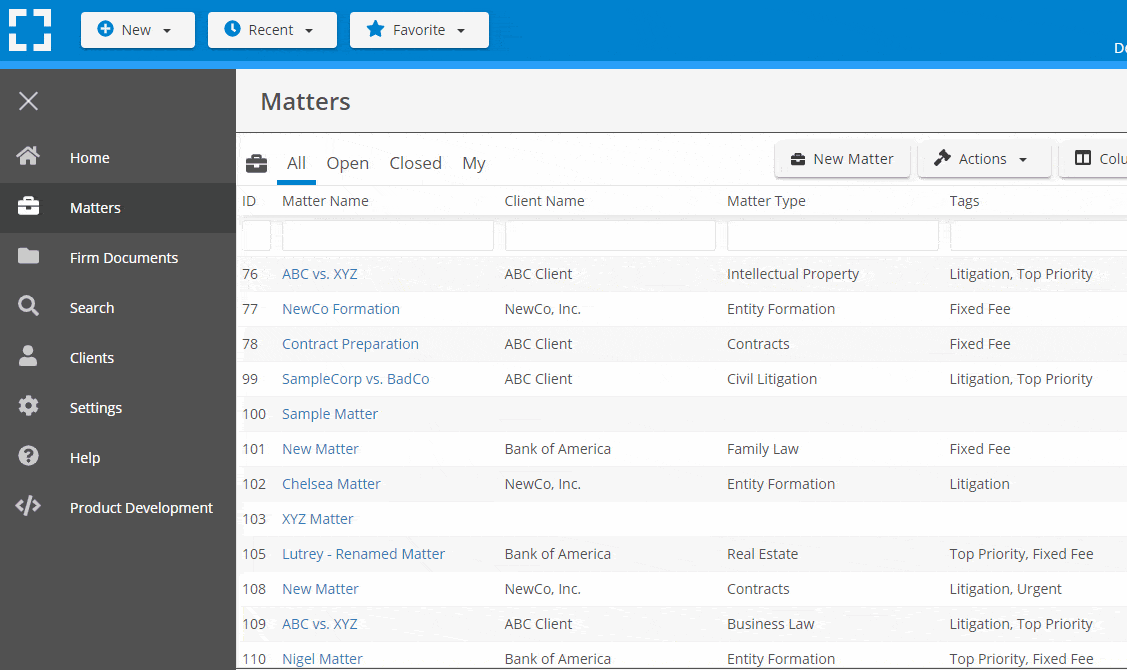
Go Beyond Basic Files & Folders
Supercharge your firm’s productivity with true DMS functions.
- Version Management
- Document Tagging & Profiling
- Document Check-Out / Check-In
- Microsoft Office Integration
- Automatic, Integrated OCR
- Convert Word Docs to PDF
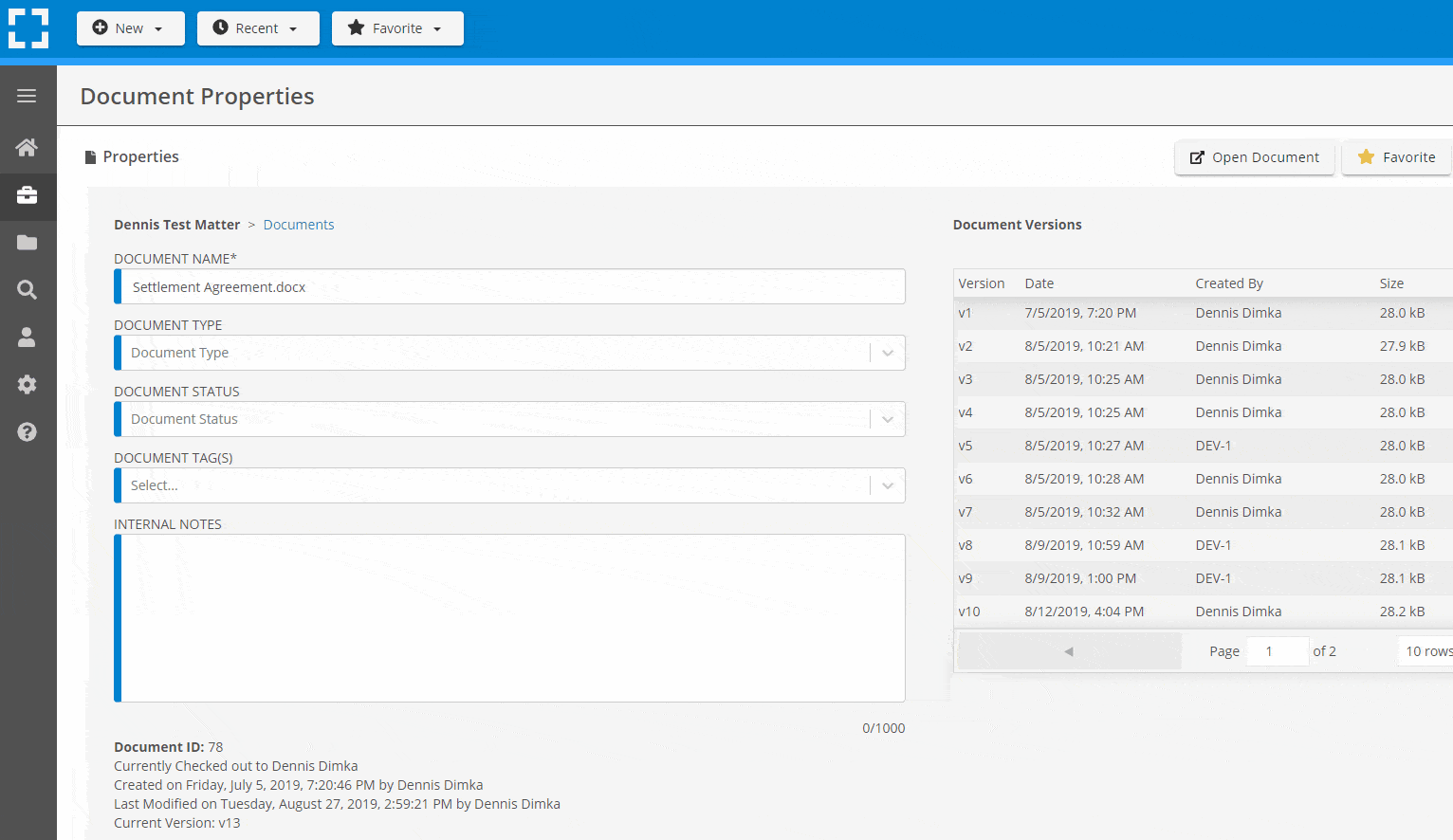
Search Everything
LexWorkplace is like Google for your law firm. Search across millions of pages, documents, folder email and notes in seconds. Refine your search by matter, document type, author and more.
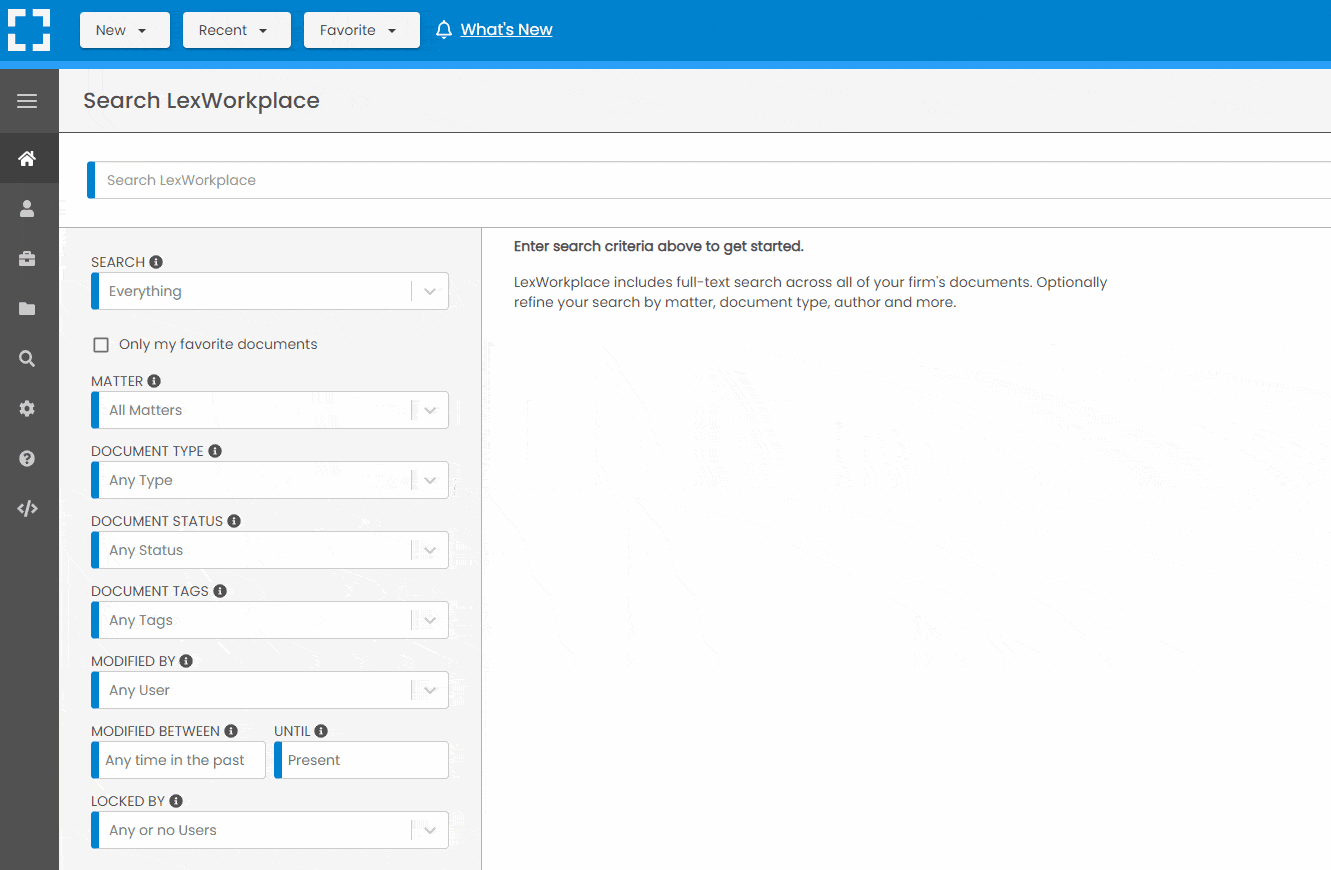
Search by…
- Client or Matter
- Document Type (Contract, Complaint, Order, etc.)
- Document Status (Draft, Final, etc.)
- Document Tags (Filed With Court, Fully Executed, etc.)
Outlook Integration + Comprehensive Email Management
Save emails to a matter without leaving Outlook. Saved emails are accessible to your entire team, organized and searchable.
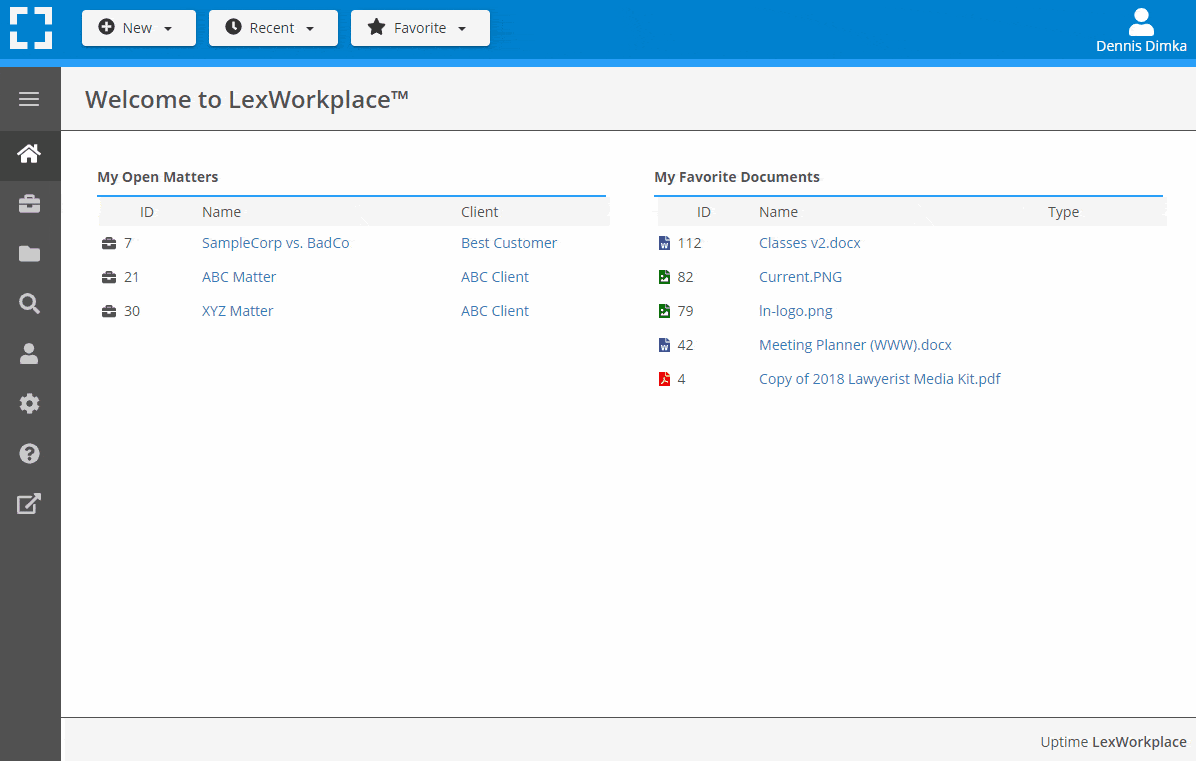
- Outlook Add-In that Works With Windows and Macs
- Save Entire, Original Email to a Matter in a LexWorkplace
- Email De-Duplication
- Organize Emails into Folders, Subfolders
Works with Windows and Macs
All of LexWorkplace is compatible with both Windows and Mac computers.
What Clients Say
Lawyers love LexWorkplace. See how the system streamlined one lawyer’s practice.
Watch the 5-Minute Demo
See LexWorkplace in action in our quick 5-minute overview and demonstration.
Or, if you want a one-on-one demo, or want to talk about LexWorkplace for your firm, schedule a call or demo below.
You Might Also Like
March 28, 2024
Law Firm Software: Your 2024 Guide to Building Your Tech Stack
Top Law Firm Software: Practice…
March 21, 2024
Cost Analysis and ROI of Legal Document Management Software
Discover how implementing a Document…
Want More Legal Technology Tips?
Subscribe to Uptime Legal to get the latest legal tech tips and trends, delivered to your inbox weekly.

